Project Proposal: Analyzing Ethics of Technology in Education
VerifiedAdded on 2023/06/13
|18
|4487
|152
Project
AI Summary
This research proposal examines the ethical considerations surrounding the use of technology in education, focusing on both teachers and students. It addresses issues such as student safety and privacy, unauthorized access, and the digital divide. The proposal includes a literature review covering the role of ethical education, an educational technology ethics framework, and ethical principles. The research methodology outlines the research philosophy, approach, design, and data collection methods. A detailed project plan is provided, along with relevant references and appendices that consider ethical issues. The goal is to analyze the impacts of ethical issues of technology within the education system and to promote a better learning environment through ethical practices.
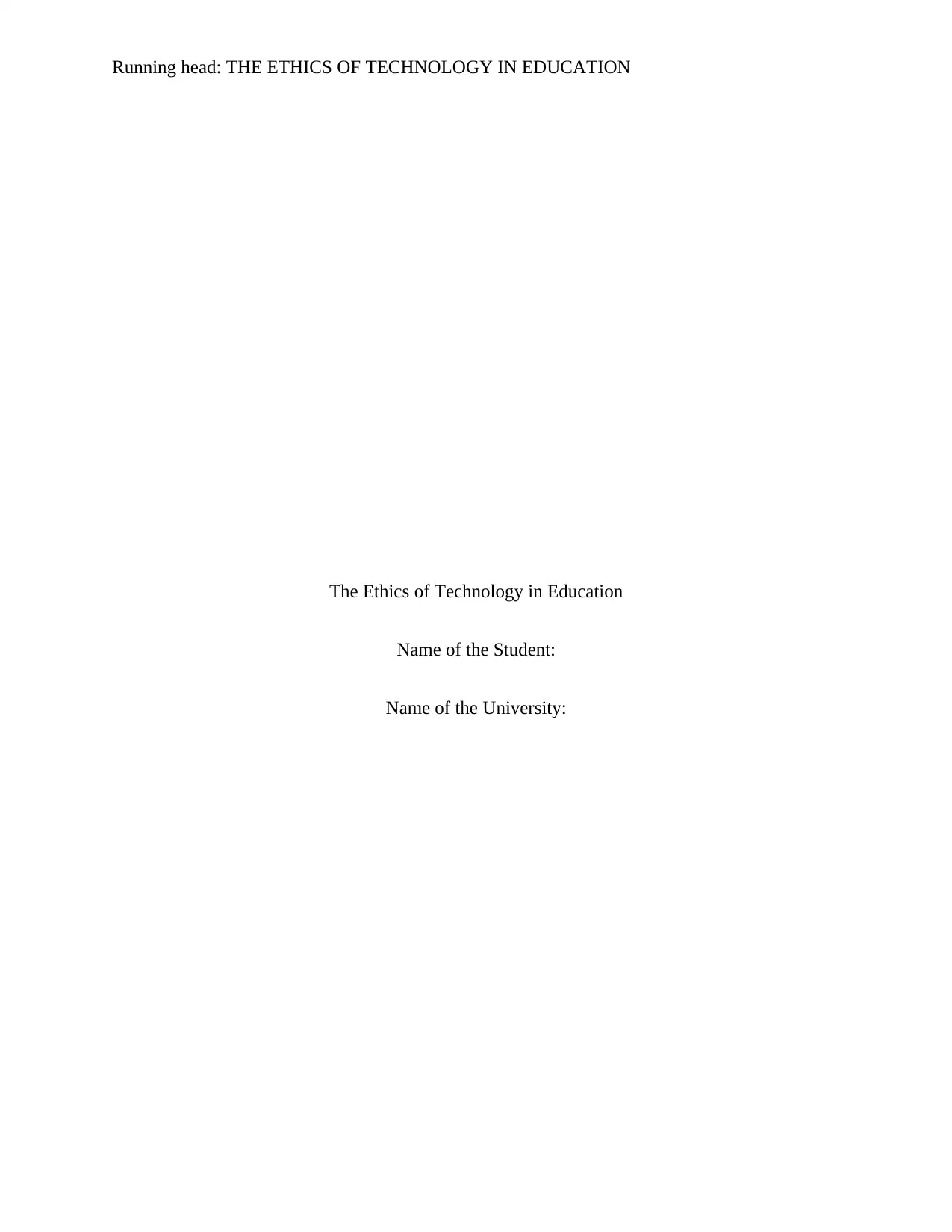
Running head: THE ETHICS OF TECHNOLOGY IN EDUCATION
The Ethics of Technology in Education
Name of the Student:
Name of the University:
The Ethics of Technology in Education
Name of the Student:
Name of the University:
Paraphrase This Document
Need a fresh take? Get an instant paraphrase of this document with our AI Paraphraser
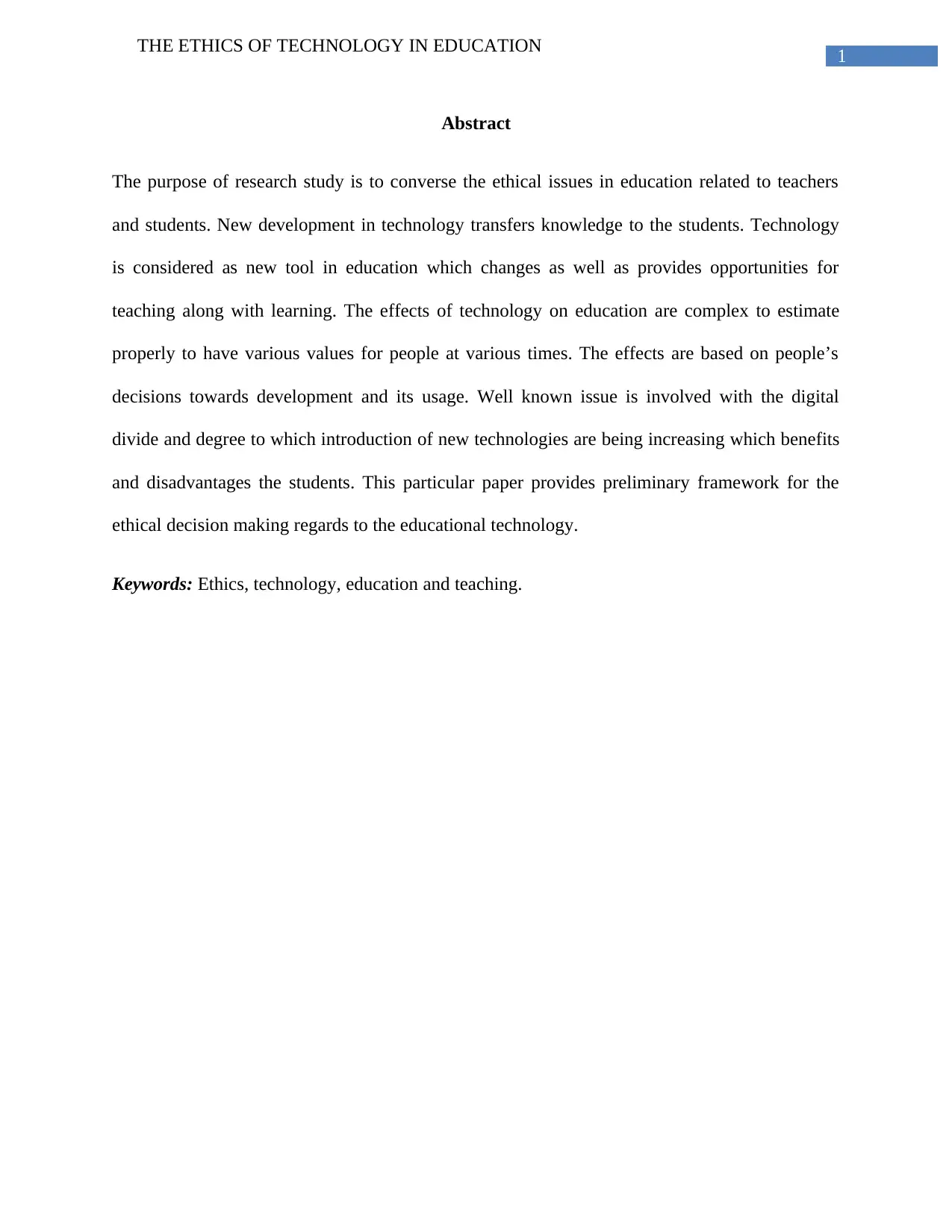
1
THE ETHICS OF TECHNOLOGY IN EDUCATION
Abstract
The purpose of research study is to converse the ethical issues in education related to teachers
and students. New development in technology transfers knowledge to the students. Technology
is considered as new tool in education which changes as well as provides opportunities for
teaching along with learning. The effects of technology on education are complex to estimate
properly to have various values for people at various times. The effects are based on people’s
decisions towards development and its usage. Well known issue is involved with the digital
divide and degree to which introduction of new technologies are being increasing which benefits
and disadvantages the students. This particular paper provides preliminary framework for the
ethical decision making regards to the educational technology.
Keywords: Ethics, technology, education and teaching.
THE ETHICS OF TECHNOLOGY IN EDUCATION
Abstract
The purpose of research study is to converse the ethical issues in education related to teachers
and students. New development in technology transfers knowledge to the students. Technology
is considered as new tool in education which changes as well as provides opportunities for
teaching along with learning. The effects of technology on education are complex to estimate
properly to have various values for people at various times. The effects are based on people’s
decisions towards development and its usage. Well known issue is involved with the digital
divide and degree to which introduction of new technologies are being increasing which benefits
and disadvantages the students. This particular paper provides preliminary framework for the
ethical decision making regards to the educational technology.
Keywords: Ethics, technology, education and teaching.
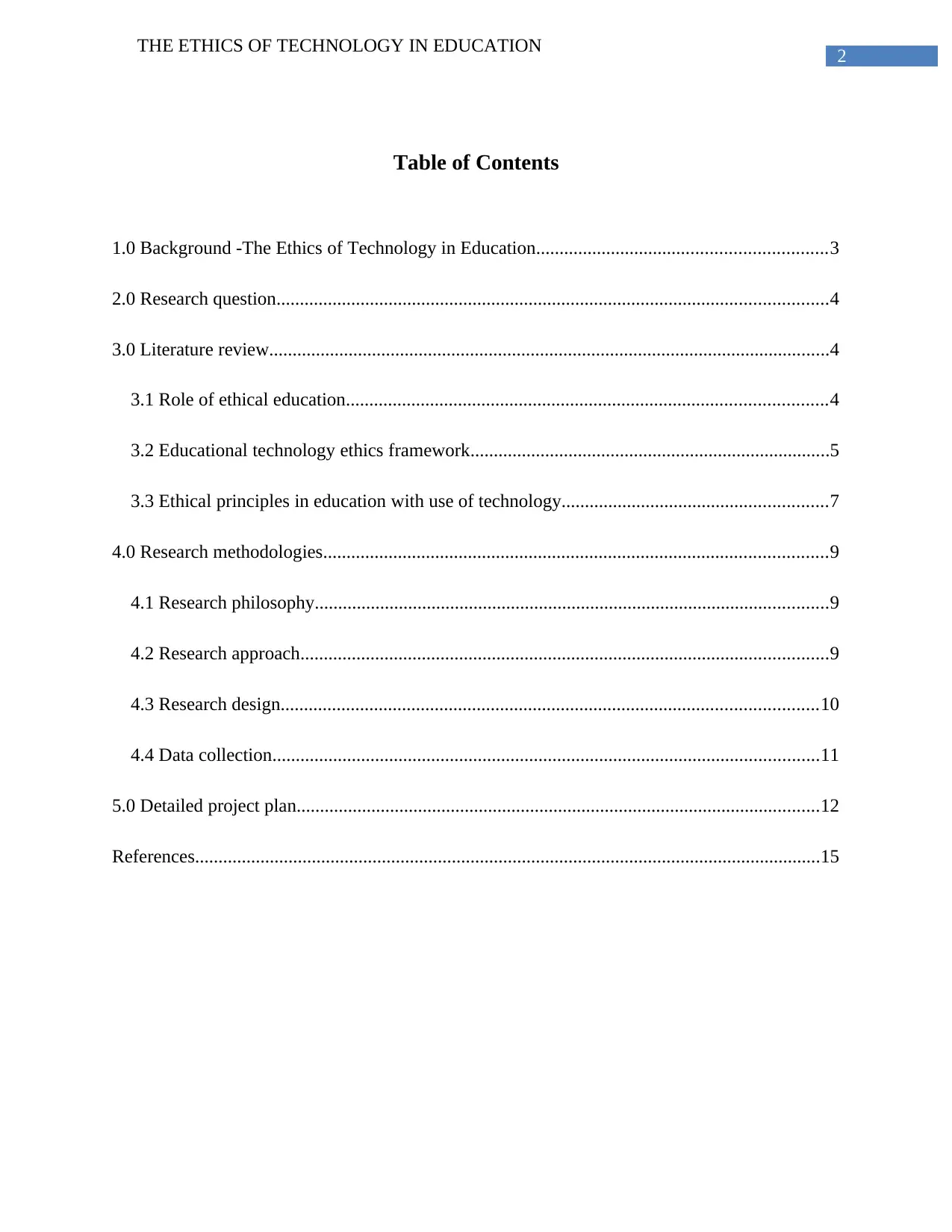
2
THE ETHICS OF TECHNOLOGY IN EDUCATION
Table of Contents
1.0 Background -The Ethics of Technology in Education..............................................................3
2.0 Research question......................................................................................................................4
3.0 Literature review........................................................................................................................4
3.1 Role of ethical education.......................................................................................................4
3.2 Educational technology ethics framework.............................................................................5
3.3 Ethical principles in education with use of technology.........................................................7
4.0 Research methodologies............................................................................................................9
4.1 Research philosophy..............................................................................................................9
4.2 Research approach.................................................................................................................9
4.3 Research design...................................................................................................................10
4.4 Data collection.....................................................................................................................11
5.0 Detailed project plan................................................................................................................12
References......................................................................................................................................15
THE ETHICS OF TECHNOLOGY IN EDUCATION
Table of Contents
1.0 Background -The Ethics of Technology in Education..............................................................3
2.0 Research question......................................................................................................................4
3.0 Literature review........................................................................................................................4
3.1 Role of ethical education.......................................................................................................4
3.2 Educational technology ethics framework.............................................................................5
3.3 Ethical principles in education with use of technology.........................................................7
4.0 Research methodologies............................................................................................................9
4.1 Research philosophy..............................................................................................................9
4.2 Research approach.................................................................................................................9
4.3 Research design...................................................................................................................10
4.4 Data collection.....................................................................................................................11
5.0 Detailed project plan................................................................................................................12
References......................................................................................................................................15
⊘ This is a preview!⊘
Do you want full access?
Subscribe today to unlock all pages.

Trusted by 1+ million students worldwide
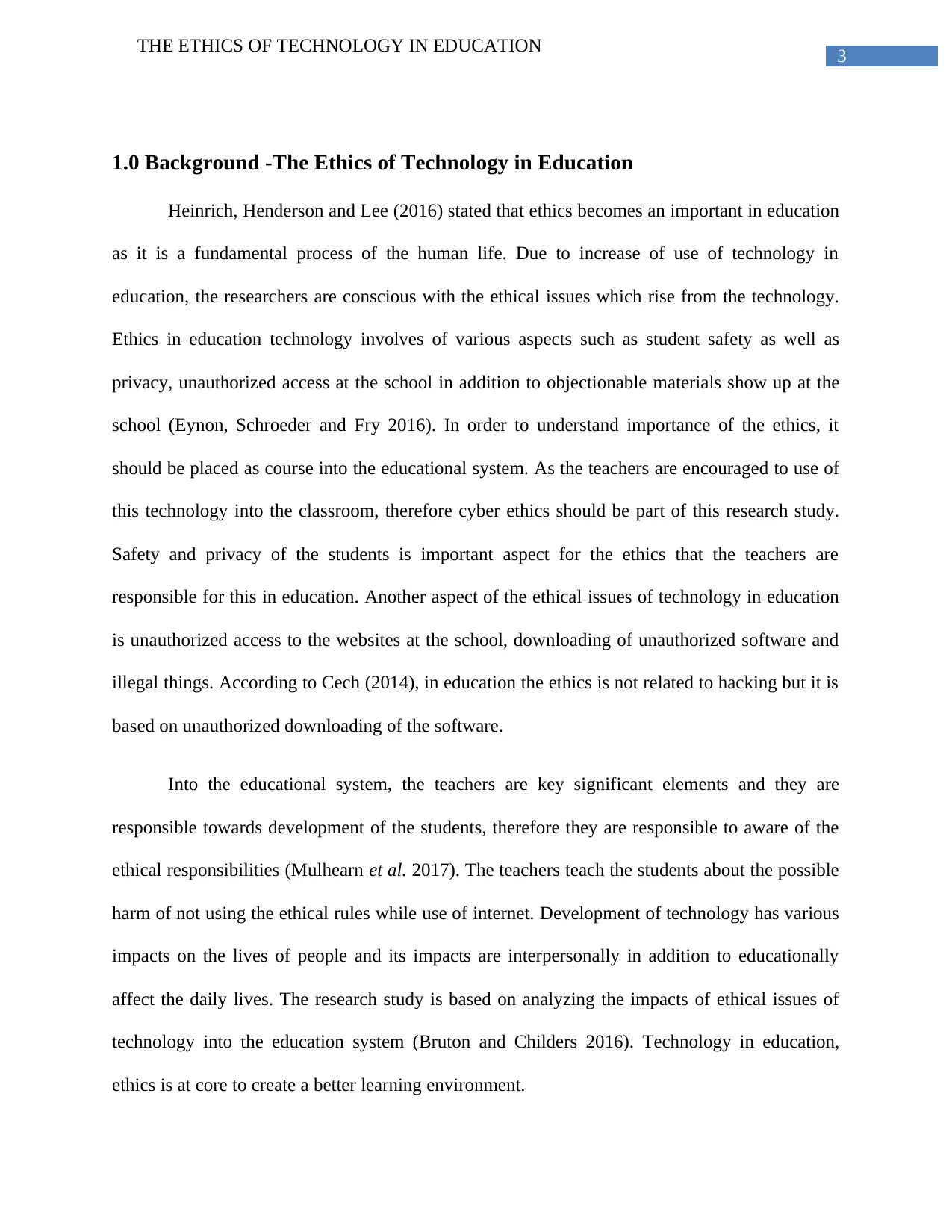
3
THE ETHICS OF TECHNOLOGY IN EDUCATION
1.0 Background -The Ethics of Technology in Education
Heinrich, Henderson and Lee (2016) stated that ethics becomes an important in education
as it is a fundamental process of the human life. Due to increase of use of technology in
education, the researchers are conscious with the ethical issues which rise from the technology.
Ethics in education technology involves of various aspects such as student safety as well as
privacy, unauthorized access at the school in addition to objectionable materials show up at the
school (Eynon, Schroeder and Fry 2016). In order to understand importance of the ethics, it
should be placed as course into the educational system. As the teachers are encouraged to use of
this technology into the classroom, therefore cyber ethics should be part of this research study.
Safety and privacy of the students is important aspect for the ethics that the teachers are
responsible for this in education. Another aspect of the ethical issues of technology in education
is unauthorized access to the websites at the school, downloading of unauthorized software and
illegal things. According to Cech (2014), in education the ethics is not related to hacking but it is
based on unauthorized downloading of the software.
Into the educational system, the teachers are key significant elements and they are
responsible towards development of the students, therefore they are responsible to aware of the
ethical responsibilities (Mulhearn et al. 2017). The teachers teach the students about the possible
harm of not using the ethical rules while use of internet. Development of technology has various
impacts on the lives of people and its impacts are interpersonally in addition to educationally
affect the daily lives. The research study is based on analyzing the impacts of ethical issues of
technology into the education system (Bruton and Childers 2016). Technology in education,
ethics is at core to create a better learning environment.
THE ETHICS OF TECHNOLOGY IN EDUCATION
1.0 Background -The Ethics of Technology in Education
Heinrich, Henderson and Lee (2016) stated that ethics becomes an important in education
as it is a fundamental process of the human life. Due to increase of use of technology in
education, the researchers are conscious with the ethical issues which rise from the technology.
Ethics in education technology involves of various aspects such as student safety as well as
privacy, unauthorized access at the school in addition to objectionable materials show up at the
school (Eynon, Schroeder and Fry 2016). In order to understand importance of the ethics, it
should be placed as course into the educational system. As the teachers are encouraged to use of
this technology into the classroom, therefore cyber ethics should be part of this research study.
Safety and privacy of the students is important aspect for the ethics that the teachers are
responsible for this in education. Another aspect of the ethical issues of technology in education
is unauthorized access to the websites at the school, downloading of unauthorized software and
illegal things. According to Cech (2014), in education the ethics is not related to hacking but it is
based on unauthorized downloading of the software.
Into the educational system, the teachers are key significant elements and they are
responsible towards development of the students, therefore they are responsible to aware of the
ethical responsibilities (Mulhearn et al. 2017). The teachers teach the students about the possible
harm of not using the ethical rules while use of internet. Development of technology has various
impacts on the lives of people and its impacts are interpersonally in addition to educationally
affect the daily lives. The research study is based on analyzing the impacts of ethical issues of
technology into the education system (Bruton and Childers 2016). Technology in education,
ethics is at core to create a better learning environment.
Paraphrase This Document
Need a fresh take? Get an instant paraphrase of this document with our AI Paraphraser
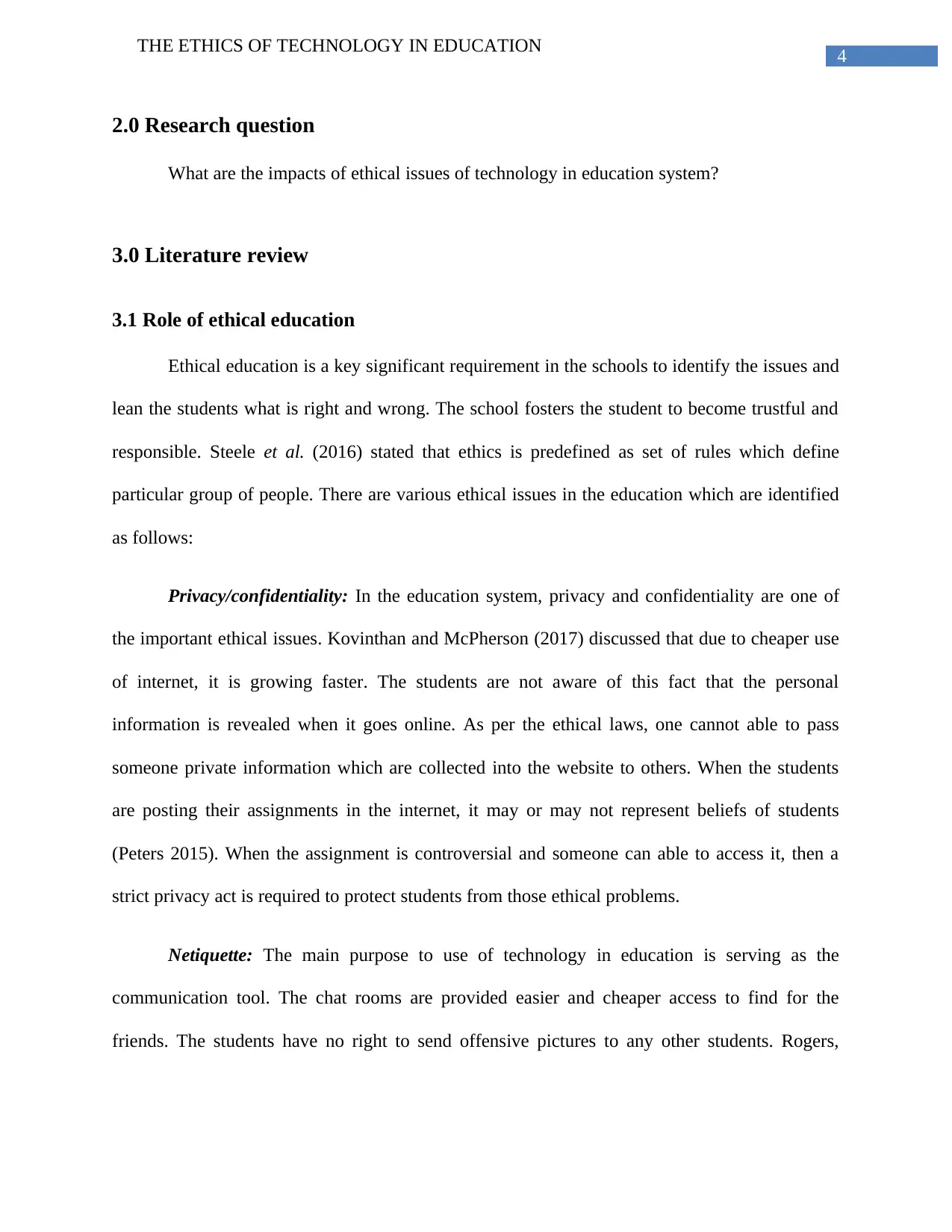
4
THE ETHICS OF TECHNOLOGY IN EDUCATION
2.0 Research question
What are the impacts of ethical issues of technology in education system?
3.0 Literature review
3.1 Role of ethical education
Ethical education is a key significant requirement in the schools to identify the issues and
lean the students what is right and wrong. The school fosters the student to become trustful and
responsible. Steele et al. (2016) stated that ethics is predefined as set of rules which define
particular group of people. There are various ethical issues in the education which are identified
as follows:
Privacy/confidentiality: In the education system, privacy and confidentiality are one of
the important ethical issues. Kovinthan and McPherson (2017) discussed that due to cheaper use
of internet, it is growing faster. The students are not aware of this fact that the personal
information is revealed when it goes online. As per the ethical laws, one cannot able to pass
someone private information which are collected into the website to others. When the students
are posting their assignments in the internet, it may or may not represent beliefs of students
(Peters 2015). When the assignment is controversial and someone can able to access it, then a
strict privacy act is required to protect students from those ethical problems.
Netiquette: The main purpose to use of technology in education is serving as the
communication tool. The chat rooms are provided easier and cheaper access to find for the
friends. The students have no right to send offensive pictures to any other students. Rogers,
THE ETHICS OF TECHNOLOGY IN EDUCATION
2.0 Research question
What are the impacts of ethical issues of technology in education system?
3.0 Literature review
3.1 Role of ethical education
Ethical education is a key significant requirement in the schools to identify the issues and
lean the students what is right and wrong. The school fosters the student to become trustful and
responsible. Steele et al. (2016) stated that ethics is predefined as set of rules which define
particular group of people. There are various ethical issues in the education which are identified
as follows:
Privacy/confidentiality: In the education system, privacy and confidentiality are one of
the important ethical issues. Kovinthan and McPherson (2017) discussed that due to cheaper use
of internet, it is growing faster. The students are not aware of this fact that the personal
information is revealed when it goes online. As per the ethical laws, one cannot able to pass
someone private information which are collected into the website to others. When the students
are posting their assignments in the internet, it may or may not represent beliefs of students
(Peters 2015). When the assignment is controversial and someone can able to access it, then a
strict privacy act is required to protect students from those ethical problems.
Netiquette: The main purpose to use of technology in education is serving as the
communication tool. The chat rooms are provided easier and cheaper access to find for the
friends. The students have no right to send offensive pictures to any other students. Rogers,
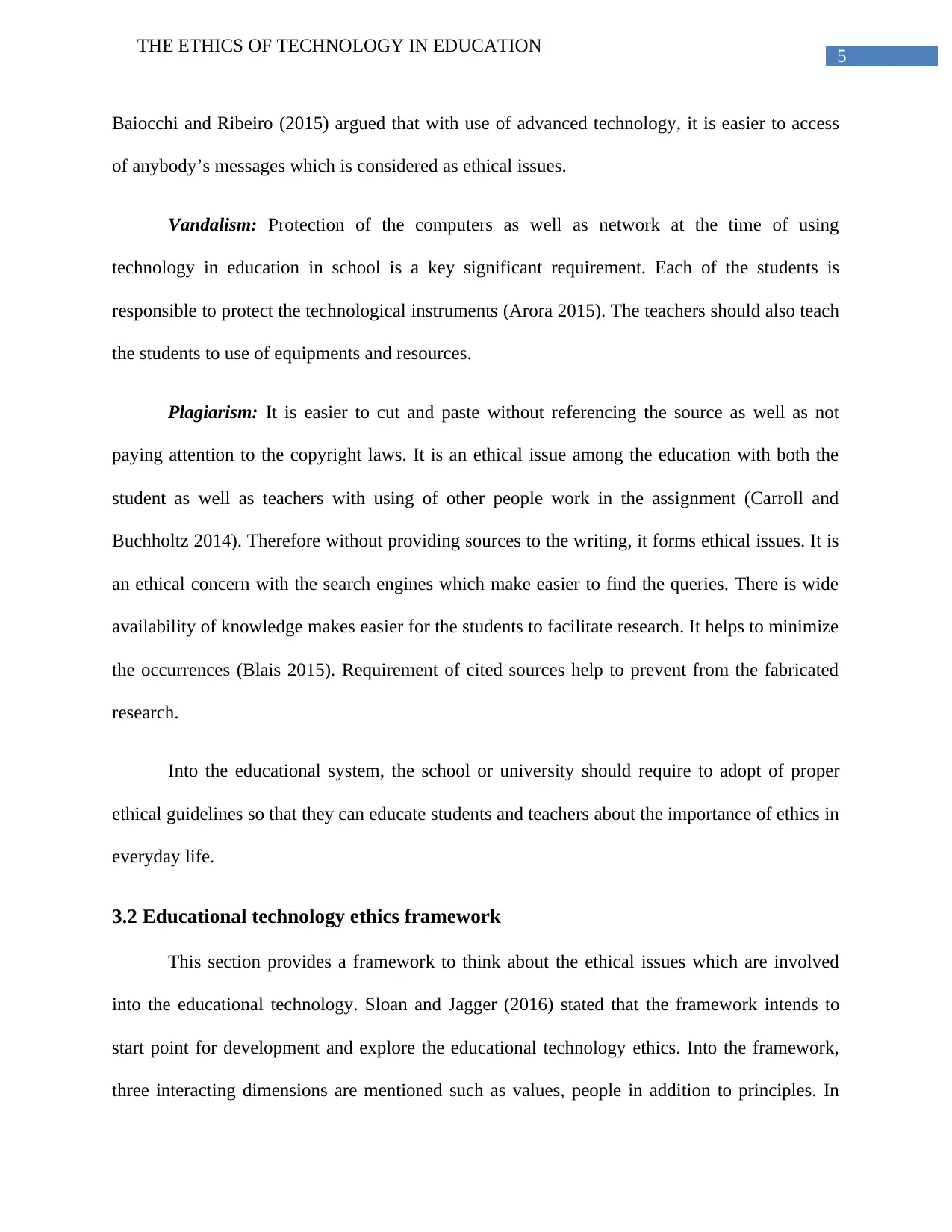
5
THE ETHICS OF TECHNOLOGY IN EDUCATION
Baiocchi and Ribeiro (2015) argued that with use of advanced technology, it is easier to access
of anybody’s messages which is considered as ethical issues.
Vandalism: Protection of the computers as well as network at the time of using
technology in education in school is a key significant requirement. Each of the students is
responsible to protect the technological instruments (Arora 2015). The teachers should also teach
the students to use of equipments and resources.
Plagiarism: It is easier to cut and paste without referencing the source as well as not
paying attention to the copyright laws. It is an ethical issue among the education with both the
student as well as teachers with using of other people work in the assignment (Carroll and
Buchholtz 2014). Therefore without providing sources to the writing, it forms ethical issues. It is
an ethical concern with the search engines which make easier to find the queries. There is wide
availability of knowledge makes easier for the students to facilitate research. It helps to minimize
the occurrences (Blais 2015). Requirement of cited sources help to prevent from the fabricated
research.
Into the educational system, the school or university should require to adopt of proper
ethical guidelines so that they can educate students and teachers about the importance of ethics in
everyday life.
3.2 Educational technology ethics framework
This section provides a framework to think about the ethical issues which are involved
into the educational technology. Sloan and Jagger (2016) stated that the framework intends to
start point for development and explore the educational technology ethics. Into the framework,
three interacting dimensions are mentioned such as values, people in addition to principles. In
THE ETHICS OF TECHNOLOGY IN EDUCATION
Baiocchi and Ribeiro (2015) argued that with use of advanced technology, it is easier to access
of anybody’s messages which is considered as ethical issues.
Vandalism: Protection of the computers as well as network at the time of using
technology in education in school is a key significant requirement. Each of the students is
responsible to protect the technological instruments (Arora 2015). The teachers should also teach
the students to use of equipments and resources.
Plagiarism: It is easier to cut and paste without referencing the source as well as not
paying attention to the copyright laws. It is an ethical issue among the education with both the
student as well as teachers with using of other people work in the assignment (Carroll and
Buchholtz 2014). Therefore without providing sources to the writing, it forms ethical issues. It is
an ethical concern with the search engines which make easier to find the queries. There is wide
availability of knowledge makes easier for the students to facilitate research. It helps to minimize
the occurrences (Blais 2015). Requirement of cited sources help to prevent from the fabricated
research.
Into the educational system, the school or university should require to adopt of proper
ethical guidelines so that they can educate students and teachers about the importance of ethics in
everyday life.
3.2 Educational technology ethics framework
This section provides a framework to think about the ethical issues which are involved
into the educational technology. Sloan and Jagger (2016) stated that the framework intends to
start point for development and explore the educational technology ethics. Into the framework,
three interacting dimensions are mentioned such as values, people in addition to principles. In
⊘ This is a preview!⊘
Do you want full access?
Subscribe today to unlock all pages.

Trusted by 1+ million students worldwide
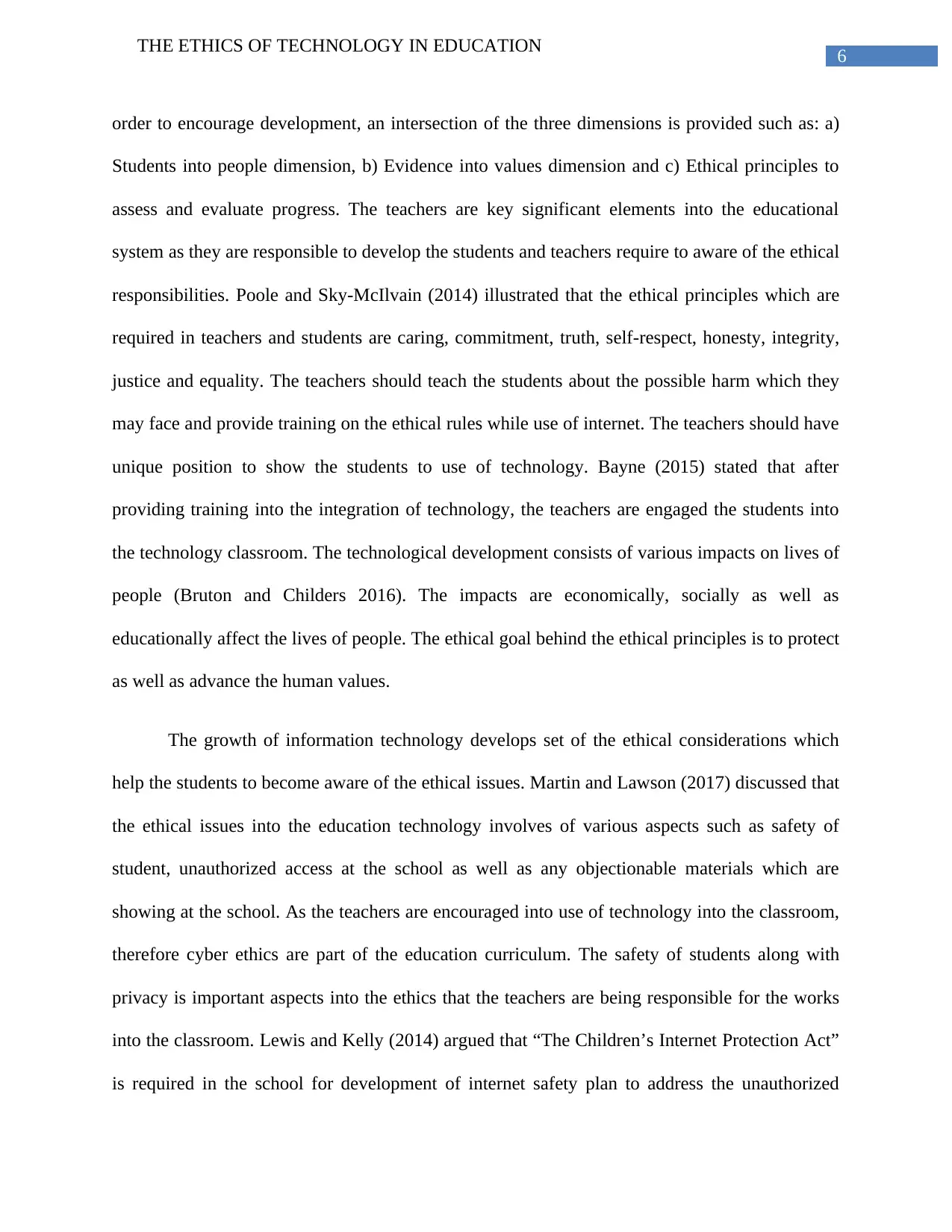
6
THE ETHICS OF TECHNOLOGY IN EDUCATION
order to encourage development, an intersection of the three dimensions is provided such as: a)
Students into people dimension, b) Evidence into values dimension and c) Ethical principles to
assess and evaluate progress. The teachers are key significant elements into the educational
system as they are responsible to develop the students and teachers require to aware of the ethical
responsibilities. Poole and Sky-McIlvain (2014) illustrated that the ethical principles which are
required in teachers and students are caring, commitment, truth, self-respect, honesty, integrity,
justice and equality. The teachers should teach the students about the possible harm which they
may face and provide training on the ethical rules while use of internet. The teachers should have
unique position to show the students to use of technology. Bayne (2015) stated that after
providing training into the integration of technology, the teachers are engaged the students into
the technology classroom. The technological development consists of various impacts on lives of
people (Bruton and Childers 2016). The impacts are economically, socially as well as
educationally affect the lives of people. The ethical goal behind the ethical principles is to protect
as well as advance the human values.
The growth of information technology develops set of the ethical considerations which
help the students to become aware of the ethical issues. Martin and Lawson (2017) discussed that
the ethical issues into the education technology involves of various aspects such as safety of
student, unauthorized access at the school as well as any objectionable materials which are
showing at the school. As the teachers are encouraged into use of technology into the classroom,
therefore cyber ethics are part of the education curriculum. The safety of students along with
privacy is important aspects into the ethics that the teachers are being responsible for the works
into the classroom. Lewis and Kelly (2014) argued that “The Children’s Internet Protection Act”
is required in the school for development of internet safety plan to address the unauthorized
THE ETHICS OF TECHNOLOGY IN EDUCATION
order to encourage development, an intersection of the three dimensions is provided such as: a)
Students into people dimension, b) Evidence into values dimension and c) Ethical principles to
assess and evaluate progress. The teachers are key significant elements into the educational
system as they are responsible to develop the students and teachers require to aware of the ethical
responsibilities. Poole and Sky-McIlvain (2014) illustrated that the ethical principles which are
required in teachers and students are caring, commitment, truth, self-respect, honesty, integrity,
justice and equality. The teachers should teach the students about the possible harm which they
may face and provide training on the ethical rules while use of internet. The teachers should have
unique position to show the students to use of technology. Bayne (2015) stated that after
providing training into the integration of technology, the teachers are engaged the students into
the technology classroom. The technological development consists of various impacts on lives of
people (Bruton and Childers 2016). The impacts are economically, socially as well as
educationally affect the lives of people. The ethical goal behind the ethical principles is to protect
as well as advance the human values.
The growth of information technology develops set of the ethical considerations which
help the students to become aware of the ethical issues. Martin and Lawson (2017) discussed that
the ethical issues into the education technology involves of various aspects such as safety of
student, unauthorized access at the school as well as any objectionable materials which are
showing at the school. As the teachers are encouraged into use of technology into the classroom,
therefore cyber ethics are part of the education curriculum. The safety of students along with
privacy is important aspects into the ethics that the teachers are being responsible for the works
into the classroom. Lewis and Kelly (2014) argued that “The Children’s Internet Protection Act”
is required in the school for development of internet safety plan to address the unauthorized
Paraphrase This Document
Need a fresh take? Get an instant paraphrase of this document with our AI Paraphraser
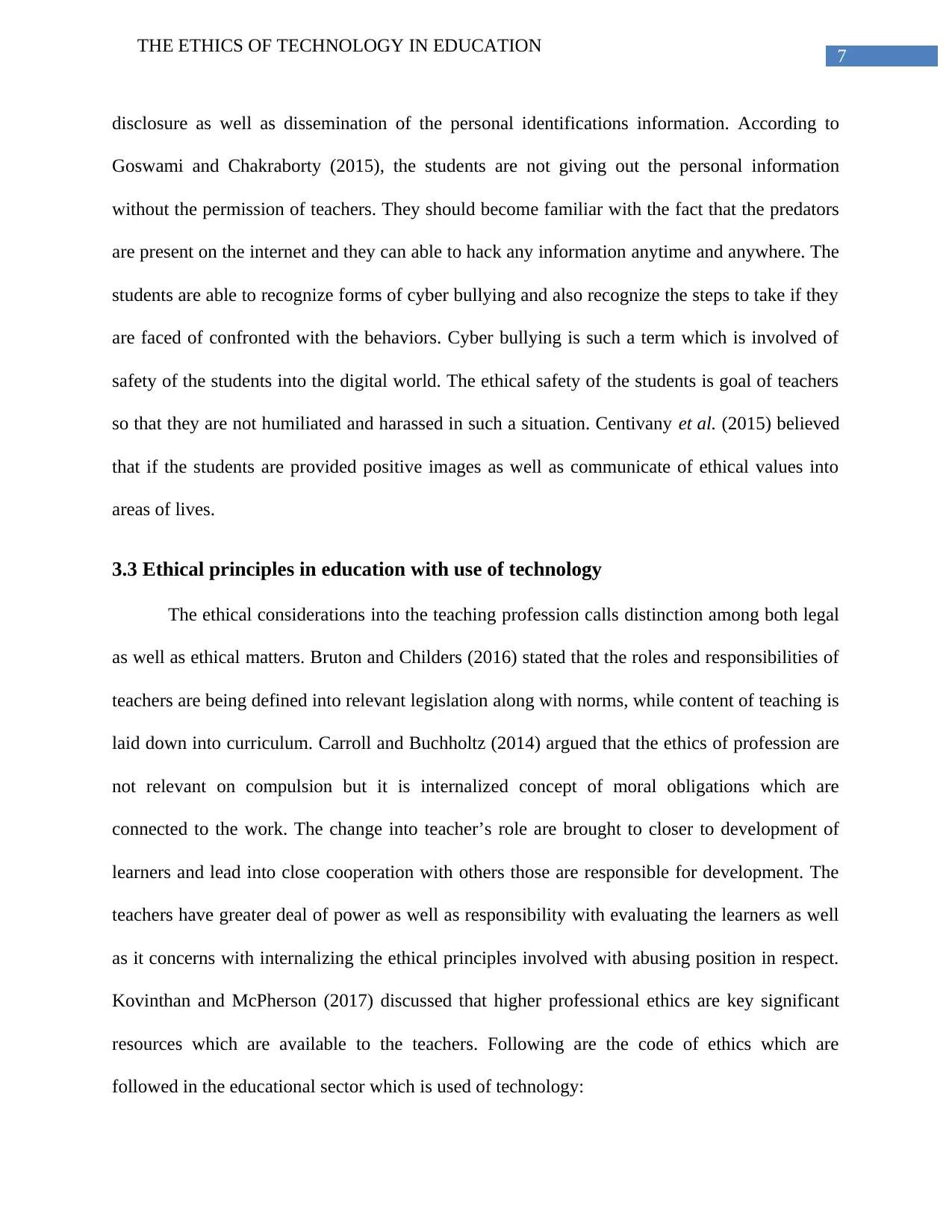
7
THE ETHICS OF TECHNOLOGY IN EDUCATION
disclosure as well as dissemination of the personal identifications information. According to
Goswami and Chakraborty (2015), the students are not giving out the personal information
without the permission of teachers. They should become familiar with the fact that the predators
are present on the internet and they can able to hack any information anytime and anywhere. The
students are able to recognize forms of cyber bullying and also recognize the steps to take if they
are faced of confronted with the behaviors. Cyber bullying is such a term which is involved of
safety of the students into the digital world. The ethical safety of the students is goal of teachers
so that they are not humiliated and harassed in such a situation. Centivany et al. (2015) believed
that if the students are provided positive images as well as communicate of ethical values into
areas of lives.
3.3 Ethical principles in education with use of technology
The ethical considerations into the teaching profession calls distinction among both legal
as well as ethical matters. Bruton and Childers (2016) stated that the roles and responsibilities of
teachers are being defined into relevant legislation along with norms, while content of teaching is
laid down into curriculum. Carroll and Buchholtz (2014) argued that the ethics of profession are
not relevant on compulsion but it is internalized concept of moral obligations which are
connected to the work. The change into teacher’s role are brought to closer to development of
learners and lead into close cooperation with others those are responsible for development. The
teachers have greater deal of power as well as responsibility with evaluating the learners as well
as it concerns with internalizing the ethical principles involved with abusing position in respect.
Kovinthan and McPherson (2017) discussed that higher professional ethics are key significant
resources which are available to the teachers. Following are the code of ethics which are
followed in the educational sector which is used of technology:
THE ETHICS OF TECHNOLOGY IN EDUCATION
disclosure as well as dissemination of the personal identifications information. According to
Goswami and Chakraborty (2015), the students are not giving out the personal information
without the permission of teachers. They should become familiar with the fact that the predators
are present on the internet and they can able to hack any information anytime and anywhere. The
students are able to recognize forms of cyber bullying and also recognize the steps to take if they
are faced of confronted with the behaviors. Cyber bullying is such a term which is involved of
safety of the students into the digital world. The ethical safety of the students is goal of teachers
so that they are not humiliated and harassed in such a situation. Centivany et al. (2015) believed
that if the students are provided positive images as well as communicate of ethical values into
areas of lives.
3.3 Ethical principles in education with use of technology
The ethical considerations into the teaching profession calls distinction among both legal
as well as ethical matters. Bruton and Childers (2016) stated that the roles and responsibilities of
teachers are being defined into relevant legislation along with norms, while content of teaching is
laid down into curriculum. Carroll and Buchholtz (2014) argued that the ethics of profession are
not relevant on compulsion but it is internalized concept of moral obligations which are
connected to the work. The change into teacher’s role are brought to closer to development of
learners and lead into close cooperation with others those are responsible for development. The
teachers have greater deal of power as well as responsibility with evaluating the learners as well
as it concerns with internalizing the ethical principles involved with abusing position in respect.
Kovinthan and McPherson (2017) discussed that higher professional ethics are key significant
resources which are available to the teachers. Following are the code of ethics which are
followed in the educational sector which is used of technology:
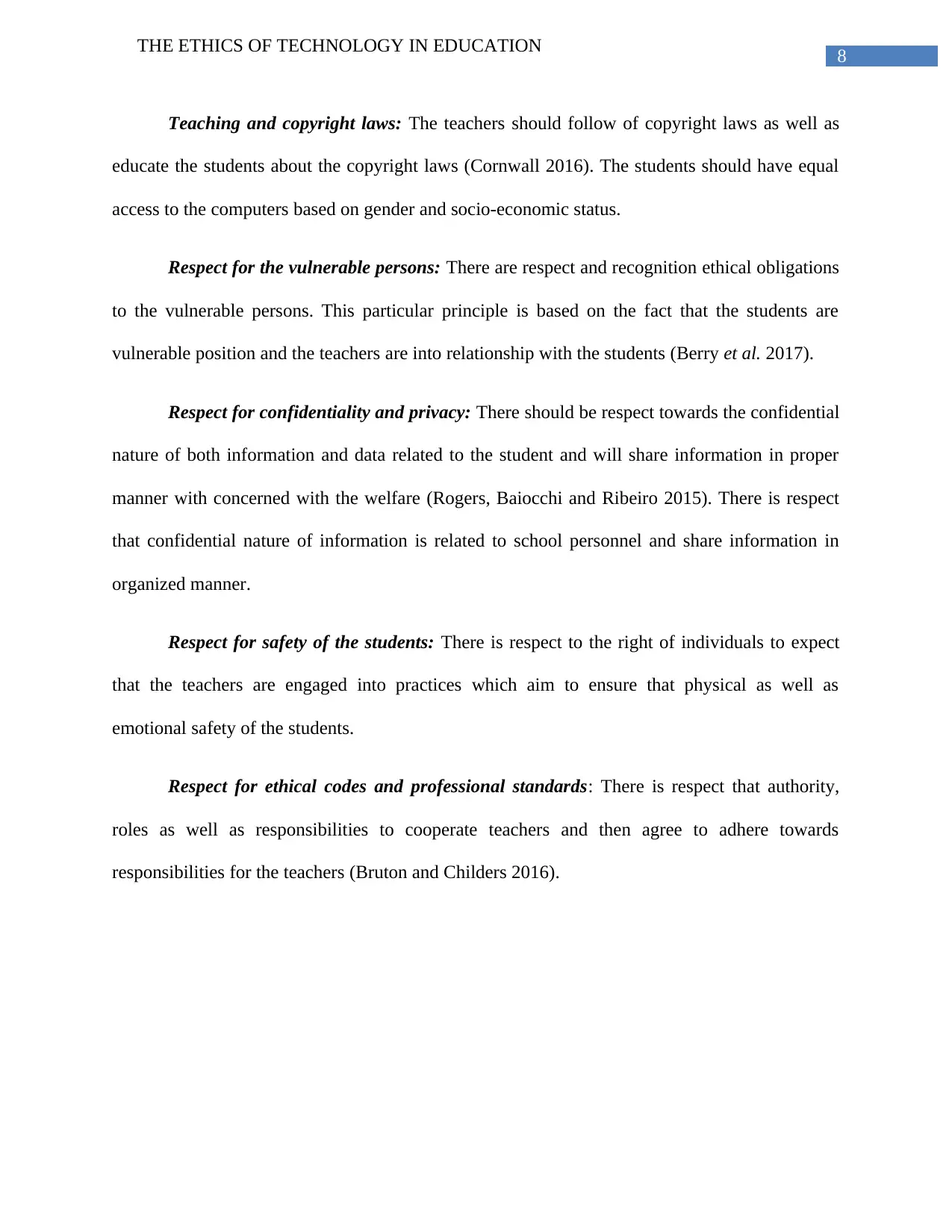
8
THE ETHICS OF TECHNOLOGY IN EDUCATION
Teaching and copyright laws: The teachers should follow of copyright laws as well as
educate the students about the copyright laws (Cornwall 2016). The students should have equal
access to the computers based on gender and socio-economic status.
Respect for the vulnerable persons: There are respect and recognition ethical obligations
to the vulnerable persons. This particular principle is based on the fact that the students are
vulnerable position and the teachers are into relationship with the students (Berry et al. 2017).
Respect for confidentiality and privacy: There should be respect towards the confidential
nature of both information and data related to the student and will share information in proper
manner with concerned with the welfare (Rogers, Baiocchi and Ribeiro 2015). There is respect
that confidential nature of information is related to school personnel and share information in
organized manner.
Respect for safety of the students: There is respect to the right of individuals to expect
that the teachers are engaged into practices which aim to ensure that physical as well as
emotional safety of the students.
Respect for ethical codes and professional standards: There is respect that authority,
roles as well as responsibilities to cooperate teachers and then agree to adhere towards
responsibilities for the teachers (Bruton and Childers 2016).
THE ETHICS OF TECHNOLOGY IN EDUCATION
Teaching and copyright laws: The teachers should follow of copyright laws as well as
educate the students about the copyright laws (Cornwall 2016). The students should have equal
access to the computers based on gender and socio-economic status.
Respect for the vulnerable persons: There are respect and recognition ethical obligations
to the vulnerable persons. This particular principle is based on the fact that the students are
vulnerable position and the teachers are into relationship with the students (Berry et al. 2017).
Respect for confidentiality and privacy: There should be respect towards the confidential
nature of both information and data related to the student and will share information in proper
manner with concerned with the welfare (Rogers, Baiocchi and Ribeiro 2015). There is respect
that confidential nature of information is related to school personnel and share information in
organized manner.
Respect for safety of the students: There is respect to the right of individuals to expect
that the teachers are engaged into practices which aim to ensure that physical as well as
emotional safety of the students.
Respect for ethical codes and professional standards: There is respect that authority,
roles as well as responsibilities to cooperate teachers and then agree to adhere towards
responsibilities for the teachers (Bruton and Childers 2016).
⊘ This is a preview!⊘
Do you want full access?
Subscribe today to unlock all pages.

Trusted by 1+ million students worldwide
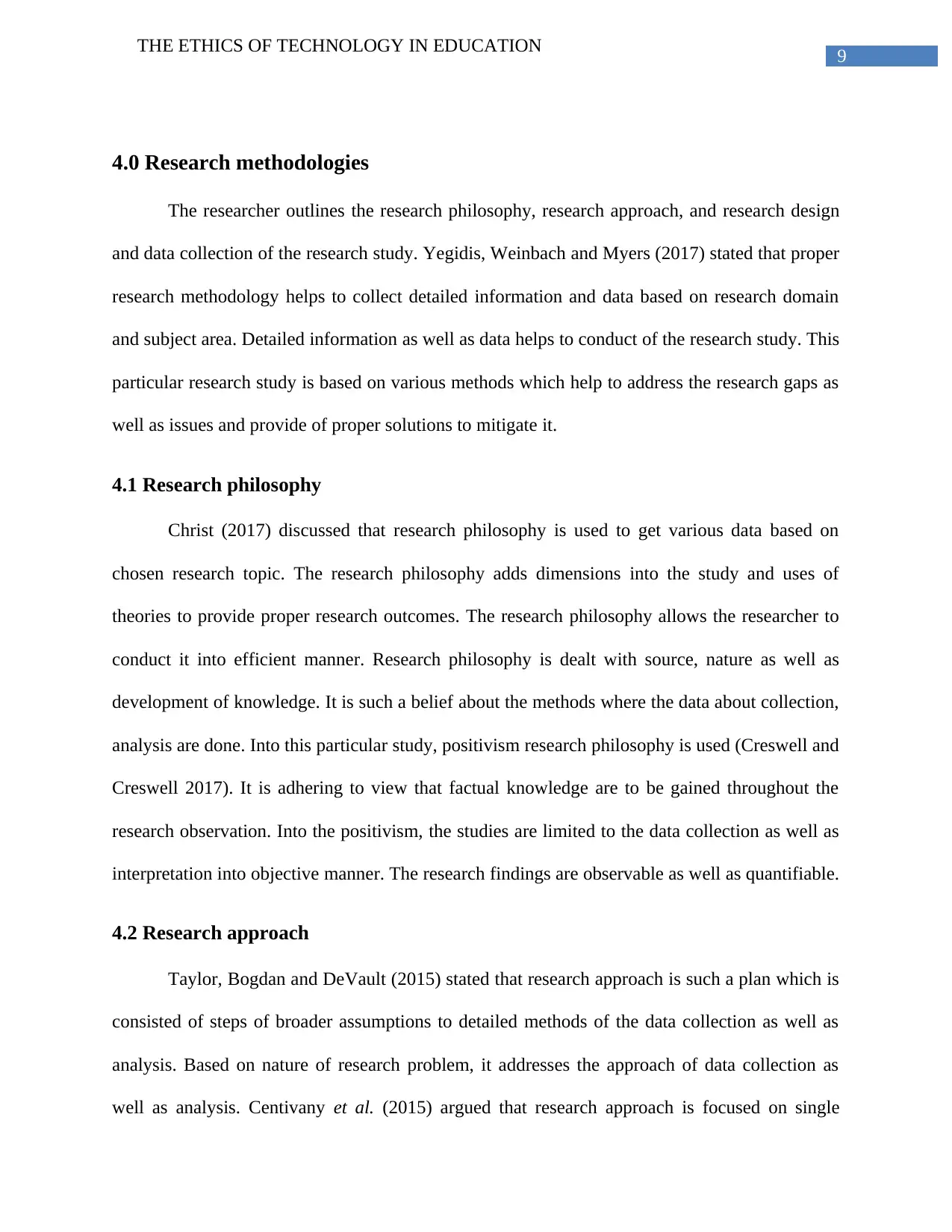
9
THE ETHICS OF TECHNOLOGY IN EDUCATION
4.0 Research methodologies
The researcher outlines the research philosophy, research approach, and research design
and data collection of the research study. Yegidis, Weinbach and Myers (2017) stated that proper
research methodology helps to collect detailed information and data based on research domain
and subject area. Detailed information as well as data helps to conduct of the research study. This
particular research study is based on various methods which help to address the research gaps as
well as issues and provide of proper solutions to mitigate it.
4.1 Research philosophy
Christ (2017) discussed that research philosophy is used to get various data based on
chosen research topic. The research philosophy adds dimensions into the study and uses of
theories to provide proper research outcomes. The research philosophy allows the researcher to
conduct it into efficient manner. Research philosophy is dealt with source, nature as well as
development of knowledge. It is such a belief about the methods where the data about collection,
analysis are done. Into this particular study, positivism research philosophy is used (Creswell and
Creswell 2017). It is adhering to view that factual knowledge are to be gained throughout the
research observation. Into the positivism, the studies are limited to the data collection as well as
interpretation into objective manner. The research findings are observable as well as quantifiable.
4.2 Research approach
Taylor, Bogdan and DeVault (2015) stated that research approach is such a plan which is
consisted of steps of broader assumptions to detailed methods of the data collection as well as
analysis. Based on nature of research problem, it addresses the approach of data collection as
well as analysis. Centivany et al. (2015) argued that research approach is focused on single
THE ETHICS OF TECHNOLOGY IN EDUCATION
4.0 Research methodologies
The researcher outlines the research philosophy, research approach, and research design
and data collection of the research study. Yegidis, Weinbach and Myers (2017) stated that proper
research methodology helps to collect detailed information and data based on research domain
and subject area. Detailed information as well as data helps to conduct of the research study. This
particular research study is based on various methods which help to address the research gaps as
well as issues and provide of proper solutions to mitigate it.
4.1 Research philosophy
Christ (2017) discussed that research philosophy is used to get various data based on
chosen research topic. The research philosophy adds dimensions into the study and uses of
theories to provide proper research outcomes. The research philosophy allows the researcher to
conduct it into efficient manner. Research philosophy is dealt with source, nature as well as
development of knowledge. It is such a belief about the methods where the data about collection,
analysis are done. Into this particular study, positivism research philosophy is used (Creswell and
Creswell 2017). It is adhering to view that factual knowledge are to be gained throughout the
research observation. Into the positivism, the studies are limited to the data collection as well as
interpretation into objective manner. The research findings are observable as well as quantifiable.
4.2 Research approach
Taylor, Bogdan and DeVault (2015) stated that research approach is such a plan which is
consisted of steps of broader assumptions to detailed methods of the data collection as well as
analysis. Based on nature of research problem, it addresses the approach of data collection as
well as analysis. Centivany et al. (2015) argued that research approach is focused on single
Paraphrase This Document
Need a fresh take? Get an instant paraphrase of this document with our AI Paraphraser
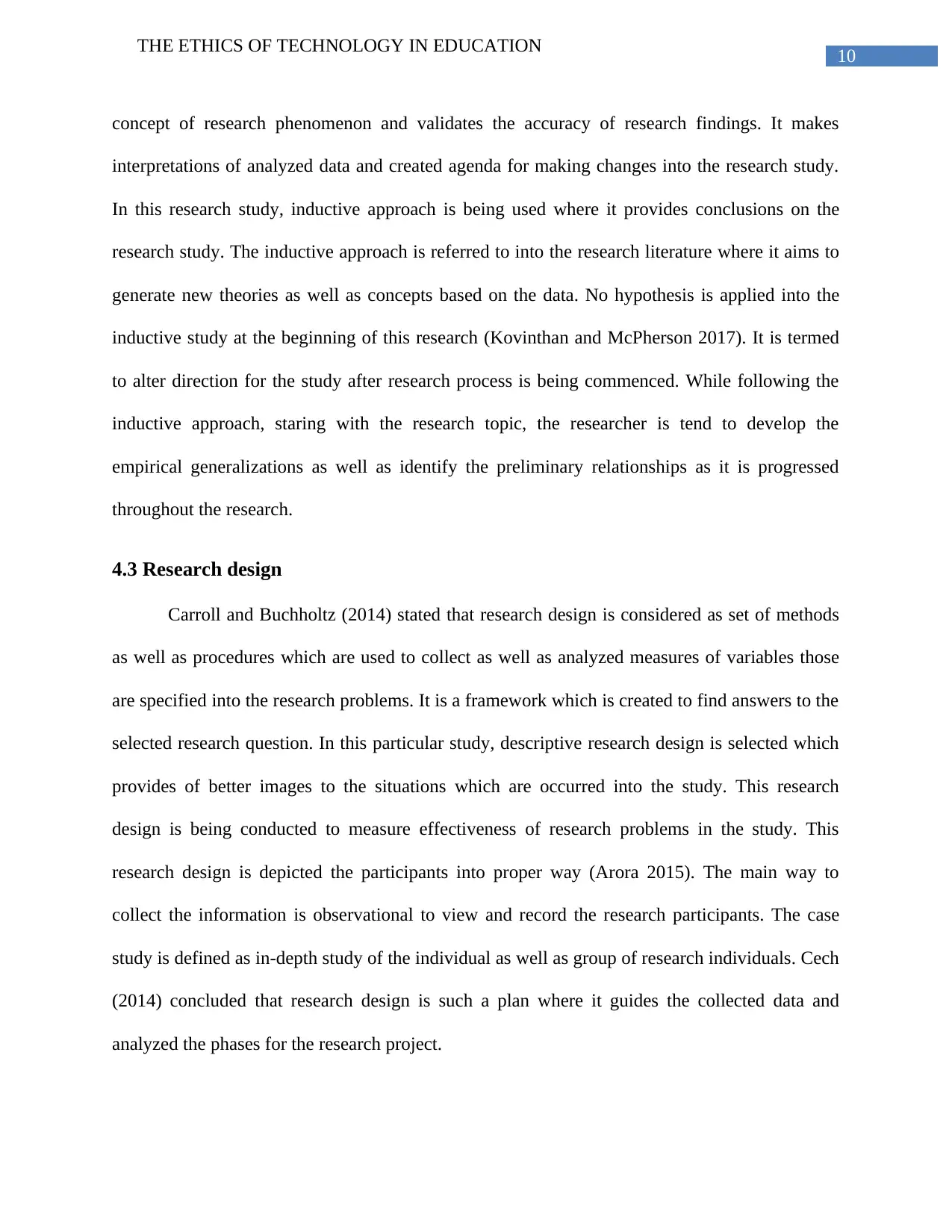
10
THE ETHICS OF TECHNOLOGY IN EDUCATION
concept of research phenomenon and validates the accuracy of research findings. It makes
interpretations of analyzed data and created agenda for making changes into the research study.
In this research study, inductive approach is being used where it provides conclusions on the
research study. The inductive approach is referred to into the research literature where it aims to
generate new theories as well as concepts based on the data. No hypothesis is applied into the
inductive study at the beginning of this research (Kovinthan and McPherson 2017). It is termed
to alter direction for the study after research process is being commenced. While following the
inductive approach, staring with the research topic, the researcher is tend to develop the
empirical generalizations as well as identify the preliminary relationships as it is progressed
throughout the research.
4.3 Research design
Carroll and Buchholtz (2014) stated that research design is considered as set of methods
as well as procedures which are used to collect as well as analyzed measures of variables those
are specified into the research problems. It is a framework which is created to find answers to the
selected research question. In this particular study, descriptive research design is selected which
provides of better images to the situations which are occurred into the study. This research
design is being conducted to measure effectiveness of research problems in the study. This
research design is depicted the participants into proper way (Arora 2015). The main way to
collect the information is observational to view and record the research participants. The case
study is defined as in-depth study of the individual as well as group of research individuals. Cech
(2014) concluded that research design is such a plan where it guides the collected data and
analyzed the phases for the research project.
THE ETHICS OF TECHNOLOGY IN EDUCATION
concept of research phenomenon and validates the accuracy of research findings. It makes
interpretations of analyzed data and created agenda for making changes into the research study.
In this research study, inductive approach is being used where it provides conclusions on the
research study. The inductive approach is referred to into the research literature where it aims to
generate new theories as well as concepts based on the data. No hypothesis is applied into the
inductive study at the beginning of this research (Kovinthan and McPherson 2017). It is termed
to alter direction for the study after research process is being commenced. While following the
inductive approach, staring with the research topic, the researcher is tend to develop the
empirical generalizations as well as identify the preliminary relationships as it is progressed
throughout the research.
4.3 Research design
Carroll and Buchholtz (2014) stated that research design is considered as set of methods
as well as procedures which are used to collect as well as analyzed measures of variables those
are specified into the research problems. It is a framework which is created to find answers to the
selected research question. In this particular study, descriptive research design is selected which
provides of better images to the situations which are occurred into the study. This research
design is being conducted to measure effectiveness of research problems in the study. This
research design is depicted the participants into proper way (Arora 2015). The main way to
collect the information is observational to view and record the research participants. The case
study is defined as in-depth study of the individual as well as group of research individuals. Cech
(2014) concluded that research design is such a plan where it guides the collected data and
analyzed the phases for the research project.
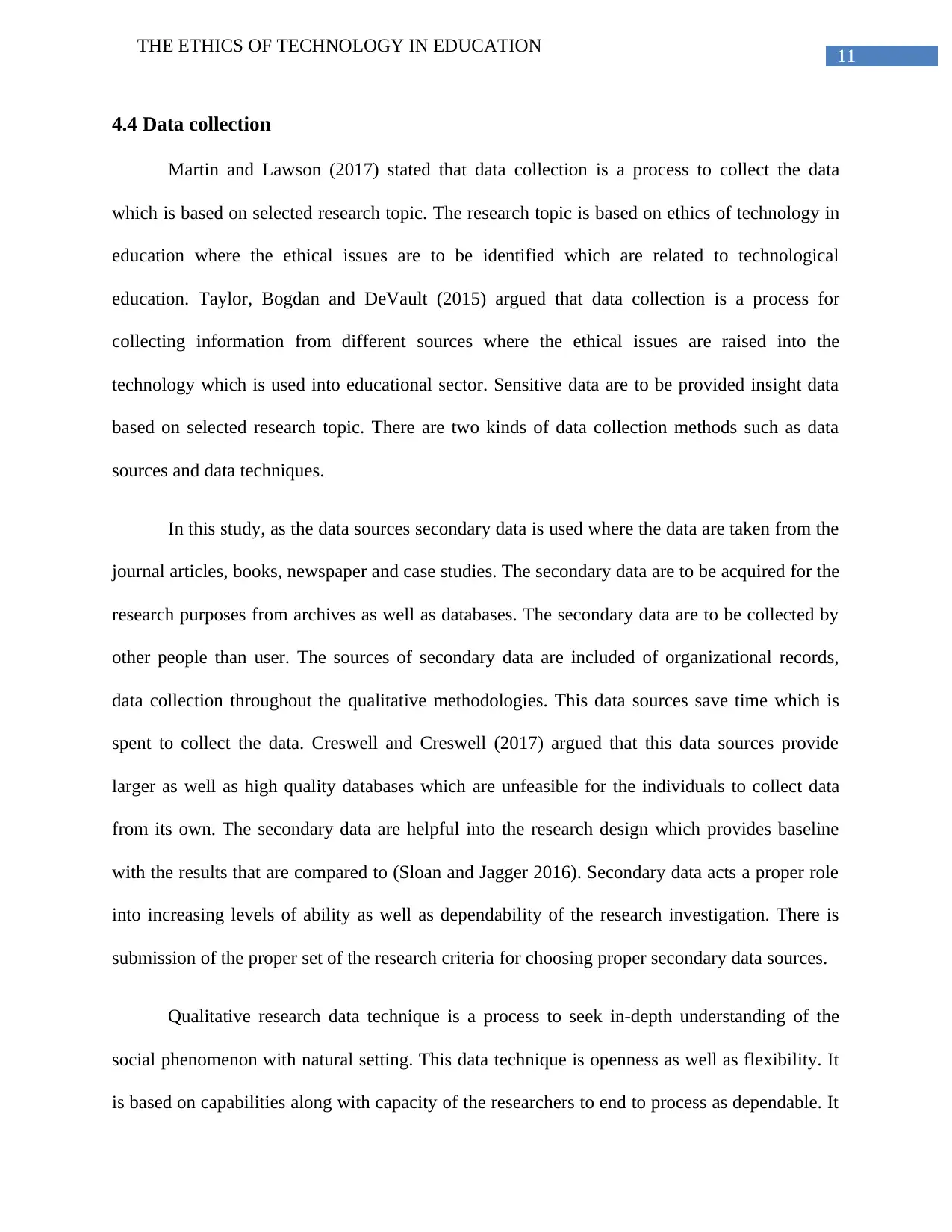
11
THE ETHICS OF TECHNOLOGY IN EDUCATION
4.4 Data collection
Martin and Lawson (2017) stated that data collection is a process to collect the data
which is based on selected research topic. The research topic is based on ethics of technology in
education where the ethical issues are to be identified which are related to technological
education. Taylor, Bogdan and DeVault (2015) argued that data collection is a process for
collecting information from different sources where the ethical issues are raised into the
technology which is used into educational sector. Sensitive data are to be provided insight data
based on selected research topic. There are two kinds of data collection methods such as data
sources and data techniques.
In this study, as the data sources secondary data is used where the data are taken from the
journal articles, books, newspaper and case studies. The secondary data are to be acquired for the
research purposes from archives as well as databases. The secondary data are to be collected by
other people than user. The sources of secondary data are included of organizational records,
data collection throughout the qualitative methodologies. This data sources save time which is
spent to collect the data. Creswell and Creswell (2017) argued that this data sources provide
larger as well as high quality databases which are unfeasible for the individuals to collect data
from its own. The secondary data are helpful into the research design which provides baseline
with the results that are compared to (Sloan and Jagger 2016). Secondary data acts a proper role
into increasing levels of ability as well as dependability of the research investigation. There is
submission of the proper set of the research criteria for choosing proper secondary data sources.
Qualitative research data technique is a process to seek in-depth understanding of the
social phenomenon with natural setting. This data technique is openness as well as flexibility. It
is based on capabilities along with capacity of the researchers to end to process as dependable. It
THE ETHICS OF TECHNOLOGY IN EDUCATION
4.4 Data collection
Martin and Lawson (2017) stated that data collection is a process to collect the data
which is based on selected research topic. The research topic is based on ethics of technology in
education where the ethical issues are to be identified which are related to technological
education. Taylor, Bogdan and DeVault (2015) argued that data collection is a process for
collecting information from different sources where the ethical issues are raised into the
technology which is used into educational sector. Sensitive data are to be provided insight data
based on selected research topic. There are two kinds of data collection methods such as data
sources and data techniques.
In this study, as the data sources secondary data is used where the data are taken from the
journal articles, books, newspaper and case studies. The secondary data are to be acquired for the
research purposes from archives as well as databases. The secondary data are to be collected by
other people than user. The sources of secondary data are included of organizational records,
data collection throughout the qualitative methodologies. This data sources save time which is
spent to collect the data. Creswell and Creswell (2017) argued that this data sources provide
larger as well as high quality databases which are unfeasible for the individuals to collect data
from its own. The secondary data are helpful into the research design which provides baseline
with the results that are compared to (Sloan and Jagger 2016). Secondary data acts a proper role
into increasing levels of ability as well as dependability of the research investigation. There is
submission of the proper set of the research criteria for choosing proper secondary data sources.
Qualitative research data technique is a process to seek in-depth understanding of the
social phenomenon with natural setting. This data technique is openness as well as flexibility. It
is based on capabilities along with capacity of the researchers to end to process as dependable. It
⊘ This is a preview!⊘
Do you want full access?
Subscribe today to unlock all pages.

Trusted by 1+ million students worldwide
1 out of 18
Related Documents
Your All-in-One AI-Powered Toolkit for Academic Success.
+13062052269
info@desklib.com
Available 24*7 on WhatsApp / Email
![[object Object]](/_next/static/media/star-bottom.7253800d.svg)
Unlock your academic potential
Copyright © 2020–2026 A2Z Services. All Rights Reserved. Developed and managed by ZUCOL.





